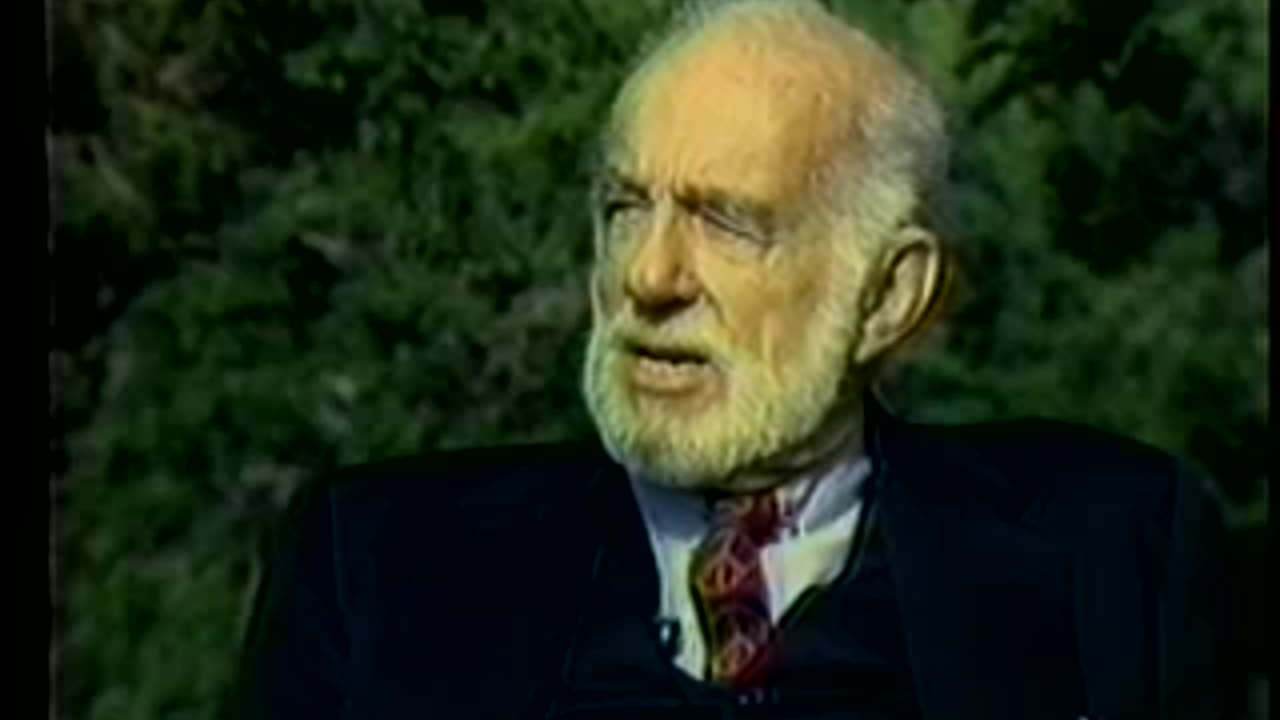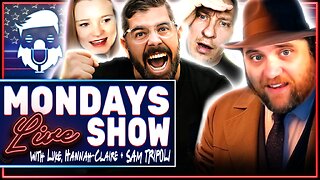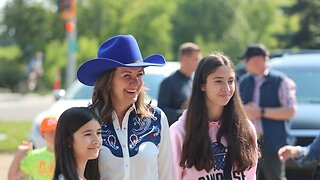Premium Only Content

Dr. Spock: One of the Most Influential Americans of the 20th Century
The dark side of history: https://thememoryhole.substack.com/
Benjamin McLane Spock (May 2, 1903 – March 15, 1998) was an American pediatrician[1] and left-wing political activist.[2] His book Baby and Child Care (1946) is one of the best-selling books of the 20th century, selling 500,000 copies in the six months after its initial publication and 50 million by the time of Spock's death in 1998.[3] The book's premise told mothers, "You know more than you think you do."[4] Spock's parenting advice and recommendations revolutionized the upbringing of children in the U.S., and he is considered one of the most famous and influential Americans of the 20th century.[5][6]
Spock was the first pediatrician to study psychoanalysis in an effort to understand children's needs and family dynamics. His ideas influenced several generations of parents, encouraging them to be more flexible and affectionate with their children and to treat them as individuals. However, his theories were widely criticized by colleagues for relying heavily on anecdotal evidence rather than serious academic research.[7]
After undergoing a self-described "conversion to socialism", Spock became an activist in the New Left and anti-Vietnam War movements during the '60s and early '70s, culminating in his run for President of the United States as the People's Party nominee in 1972. He campaigned on a maximum wage, legalized abortion, and withdrawing troops from all foreign countries. His books were criticized by conservatives for propagating permissiveness and an expectation of instant gratification, a charge that Spock denied.[8]
Biography
Early life and education
Medal record
Men's rowing
Representing the United States
Olympic Games
Gold medal – first place 1924 Paris Eight
Benjamin McLane Spock was born May 2, 1903, in New Haven, Connecticut. His parents were Benjamin Ives Spock, Yale graduate and long-time general counsel of the New Haven Railroad, and Mildred Louise (Stoughton) Spock.[1] The family name had Dutch origins; they originally spelled it Spaak before migrating to the former colony of New Netherland.[9] Spock was one of six children, including his younger sister, environmentalist writer Marjorie Spock.[10]
Spock attended Hamden Hall Country Day School, and went on to attend his father's alma maters Phillips Andover Academy and Yale University. He studied literature and history at Yale; the lanky 6' 4" Spock was also active in college rowing. Eventually, he joined the Olympic rowing crew (Men's Eights) that won a gold medal at the 1924 games in Paris.[11] At Yale, he was inducted into the Eta chapter of the Zeta Psi fraternity and the senior society Scroll and Key. He attended the Yale School of Medicine for two years before shifting to Columbia University's College of Physicians and Surgeons, from which he graduated first in his class in 1929.[12] By that time, he had married Jane Cheney.[13]
Personal life
Jane Cheney and Spock were married in 1927. Jane assisted Spock in the research and writing of Dr. Spock's Baby & Child Care, published in 1946 by Duell, Sloan & Pearce as The Common Sense Book of Baby and Child Care. The book has sold more than 50 million copies in 42 languages.[14][15]
Jane Cheney Spock was a civil liberties advocate and mother of two sons. She was born in Manchester, Connecticut, and attended Bryn Mawr College. She was active in Americans for Democratic Action, the American Civil Liberties Union (ACLU) and the National Committee for a Sane Nuclear Policy. The Spocks divorced in 1976.[16] Cheney went on to organize and run support groups for older divorced women.[17]
In 1976, Spock married Mary Morgan.[18] They built a home on Beaver Lake in Arkansas where Spock would row daily.[19] Mary quickly adapted to Spock's life of travel and political activism, and was arrested with him many times for civil disobedience. Once they were arrested in Washington, D.C. for praying on the White House lawn. Morgan was strip-searched; Spock was not. Morgan sued the jail and the mayor of Washington, D.C. for sex discrimination. The ACLU took the case and won.
For most of his life, Spock wore Brooks Brothers suits and shirts with detachable collars, but at 75, for the first time in his life, Mary got him to try blue jeans. She joined him in meditation twice a day and introduced him to Transactional analysis (TA) therapists, massage, yoga and a macrobiotic diet which reportedly improved his health. "She gave me back my youth," Spock was quoted as saying. He adapted to her lifestyle, as she did to his. There were 40 years difference in their ages, but Spock would tell reporters they were both 16.[citation needed] Mary scheduled speaking dates and handled legal agreements for the 5th through 9th editions of Baby and Child Care. She continues to publish the book with co-author Robert Needlman.
For many years, Spock lived aboard his sailboat, the Carapace, in the British Virgin Islands off Tortola.[20] At 84, Spock won third place in a rowing contest, crossing four miles (6.4 km) of the Sir Francis Drake Channel between Tortola and Norman Island in 2.5 hours.[21] He credited his strength and good health to his lifestyle and his love for life.[14] Spock had a second sailboat named Turtle, which he lived aboard and sailed in Maine in the summers. The Spocks lived only on boats for most of 20 years.
By 1991, Spock was unable to walk without assistance and was reported as infirm shortly before his death.[22][23] At the very end of Spock's life, he was advised to come ashore by his physician, Steve Pauker, of New England Medical Center, Boston. In 1992, Spock received the Peace Abbey Courage of Conscience Award at the John F. Kennedy Presidential Library for his lifelong commitment to disarmament and peaceable child-rearing.[24][25]
Spock had two sons.[citation needed]
Spock died at a house he was renting in La Jolla, California, on March 15, 1998. His ashes were buried in Rockport, Maine, where he spent his summers.[citation needed]
Books
In 1946, Spock published The Common Sense Book of Baby and Child Care, which became a best-seller. Its message to parents is "You know more than you think you do."[4] By 1998, it had sold more than 50 million copies, and had been translated into 42 languages.[14][15] According to the New York Times, Baby and Child Care was, throughout its first 52 years, the second-best-selling book, next to the Bible.[22] According to other sources, it was among best-sellers, albeit not second-best-selling.[citation needed]
Spock advocated ideas about parenting that were considered out of the mainstream. Over time, his books helped to bring about major change. Previously, experts (such as Truby King) had told parents babies needed to learn to sleep on a regular schedule, and that picking them up and holding them when they cried would only teach them to cry more and not to sleep through the night (a notion that borrows from behaviorism). They were told[citation needed] to feed their children on a regular schedule, and that they should not pick them up, kiss them, or hug them, because that would not prepare them to be strong, independent individuals in a harsh world. In contrast, Spock encouraged parents to show affection for their children and to see them as individuals.[citation needed]
By the late 1960s, however, Spock's opposition to the Vietnam War had damaged his reputation. The 1968 edition of Baby and Child Care sold half as many copies of the prior edition.[citation needed] Later in life, Spock wrote Dr. Spock on Vietnam and co-wrote an autobiography entitled Spock on Spock (with wife Mary Morgan Spock), in which he stated his attitude toward aging: Delay and Deny.[citation needed]
In the seventh edition of Baby and Child Care published shortly after he died, Spock advocated for a bold change in children's diets, recommending children switch to a vegan diet after age 2.[26] Spock himself had switched to an all-plant diet in 1991 after a series of illnesses that left him weak and unable to walk unaided. After making the dietary change, he lost 50 pounds, regained his ability to walk and became healthier overall. The revised edition stated children on an all-plant diet will reduce their risk of developing heart disease, obesity, high blood pressure, diabetes and certain diet-related cancers. Studies suggest that vegetarian children are leaner, and adult vegetarians are known to be at lower risk of such diseases.[27] However, Spock's recommendations were criticized as being irresponsible towards children's health and children's ability to sustain normal growth, which has been aided with minerals such as calcium, riboflavin, vitamin D, iron, zinc and at times protein.[22]
Spock's approach to childhood nutrition was criticized by a number of experts, including co-author Boston pediatrician Steven J. Parker,[28] as too extreme and likely to result in nutritional deficiencies unless it was carefully planned and executed, which would be difficult for working parents.[22] T. Berry Brazelton, Boston City Hospital pediatrician who specialized in child behavior (and longtime admirer and friend of Dr. Spock), called the dietary recommendations "absolutely insane."[22] Neal Barnard, president of Physicians for Responsible Medicine, a Washington organization advocating strict vegetarian diets, acknowledged he drafted the nutrition section in the 1998 edition of Baby and Child Care, but said Spock edited it to give it "his personal touch."[22] It was acknowledged that in Spock's final years, he had strokes, bouts with pneumonia and a heart attack.[29]
Views
Sudden infant death syndrome
Spock advocated that infants should not sleep on their backs, commenting in his 1958 edition that "if [an infant] vomits, he's more likely to choke on the vomitus." This advice was extremely influential on healthcare providers, with nearly unanimous support through the 1990s.[30] Later empirical studies, however, found a significantly increased risk of sudden infant death syndrome (SIDS) associated with infants sleeping on their abdomens. Advocates of evidence-based medicine have used this as an example of the importance of basing healthcare recommendations on statistical evidence. One researcher estimated that as many as 50,000 infant deaths in Europe, Australia, and the U.S. could have been prevented had this advice been changed by 1970 when such evidence became available.[31]
Male circumcision
In the 1940s, Spock favored circumcision of males performed within a few days of birth. However, in the 1976 revision of Baby and Child Care he concurred with a 1971 American Academy of Pediatrics task force that there was no medical reason to recommend routine circumcision, and in a 1989 article for Redbook he stated that "circumcision of males is traumatic, painful, and of questionable value."[32] He received the first Human Rights Award from the International Symposium on Circumcision (ISC) in 1991 and was quoted as saying, "My own preference, if I had the good fortune to have another son, would be to leave his little penis alone."[33]
Social and political activism
In 1962, Spock joined The Committee for a Sane Nuclear Policy, otherwise known as SANE. Spock was politically outspoken and active in the movement to end the Vietnam War. In 1968, he and four others (including William Sloane Coffin, Marcus Raskin, Mitchell Goodman, and Michael Ferber) were singled out for prosecution by then Attorney General Ramsey Clark on charges of conspiracy to counsel, aid, and abet resistance to the draft.[34] Spock and three of his alleged co-conspirators were convicted, although the five had never been in the same room together. His two-year prison sentence was never served; the case was appealed, and in 1969 a federal court set aside his conviction.[35]
In 1967, Spock was pressed to run as Martin Luther King Jr.'s vice-presidential running mate at the National Conference for New Politics over Labor Day weekend in Chicago.[36]
In 1968, Spock signed the "Writers and Editors War Tax Protest" pledge, vowing to refuse tax payments in protest against the Vietnam War,[37] and he later became a sponsor of the War Tax Resistance project, which practiced and advocated tax resistance as a form of anti-war protest.[38] He was also arrested for his involvement in anti-war protests resulting from his signing of the anti-war manifesto "A Call to Resist Illegitimate Authority" circulated by members of the radical intellectual collective RESIST.[39] The individuals arrested during this incident came to be known as the Boston Five.[40]
In 1968, the American Humanist Association named Spock Humanist of the Year.[41] On 15 October 1969, Spock was a featured speaker at the Moratorium to End the War in Vietnam march.[42]
In 1970, Dr. Benjamin Spock was active in The New Party serving as Honorary co-chairman with Gore Vidal. In the 1972 United States presidential election, Spock was the People's Party candidate with a platform that called for free medical care; the repeal of "victimless crime" laws, including the legalization of abortion, homosexuality, and cannabis; a guaranteed minimum income for families; and for an end to American military interventionism and the immediate withdrawal of all American troops from foreign countries.[43] In the 1970s and 1980s, Spock demonstrated and gave lectures against nuclear weapons and cuts in social welfare programs.[citation needed]
In 1972, Spock, Julius Hobson (his vice presidential candidate), Linda Jenness (Socialist Workers Party presidential candidate), and Socialist Workers Party vice presidential candidate Andrew Pulley wrote to Major General Bert A. David, commanding officer of Fort Dix, asking for permission to distribute campaign literature and to hold an election-related campaign meeting. On the basis of Fort Dix regulations 210-26 and 210–27, General David refused the request. Spock, Hobson, Jenness, Pulley, and others then filed a case that ultimately made its way to the United States Supreme Court (424 U.S. 828—Greer, Commander, Fort Dix Military Reservation, et al., v. Spock et al.), which ruled against the plaintiffs.[44]
Spock was the People's Party and the Peace and Freedom Party nominee in 1976 for vice president as the running mate of Margaret Wright.[45]
Conservative backlash
Popular preacher Norman Vincent Peale supported the Vietnam War. During the late '60s, Peale criticized the anti-Vietnam War movement and the perceived laxity of that era, blaming Dr. Spock's books: "The U.S. was paying the price of two generations that followed the Dr. Spock baby plan of instant gratification of needs."[46]
In the '60s and '70s, Spock was also blamed for the disorderliness of young people, many of whose parents had been devotees of Baby and Child Care.[14] Vice President Spiro Agnew also blamed Spock for "permissiveness".[14][47] These allegations were enthusiastically embraced by conservative adults, who viewed the rebellious youth of that era with disapproval, referring to them as "the Spock generation".[48][49][50]
Spock's supporters countered that these criticisms betrayed an ignorance of what Spock had actually written, and/or a political bias against Spock's left-wing political activities. Spock himself, in his autobiography, said he had never advocated permissiveness; also, the attacks and claims that he had ruined American youth only arose after his public opposition to the Vietnam War. He regarded these claims as ad hominem attacks, whose political motivation and nature were clear.[48][49]
Spock addressed these accusations in the first chapter of his 1994 book, Rebuilding American Family Values: A Better World for Our Children.
The Permissive Label: A couple weeks after my indictment [for "conspiracy to counsel, aid and abet resistance to the military draft"], I was accused by Reverend Norman Vincent Peale, a well-known clergyman and author who supported the Vietnam War, of corrupting an entire generation. In a sermon widely reported in the press, Reverend Peale blamed me for all the lack of patriotism, lack of responsibility, and lack of discipline of the young people who opposed the war. All these failings, he said, were due to my having told their parents to give them "instant gratification" as babies. I was showered with blame in dozens of editorials and columns from primarily conservative newspapers all over the country heartily agreeing with Peale's assertions.
Many parents have since stopped me on the street or in airports to thank me for helping them to raise fine children, and they've often added, "I don't see any instant gratification in Baby and Child Care". I say they're right—I've always advised parents to give their children firm, clear leadership and to ask for cooperation and politeness in return. On the other hand, I've also received letters from conservative mothers saying, in effect, "Thank God I've never used your horrible book. That's why my children take baths, wear clean clothes and get good grades."
Since I received the first accusation 22 years after Baby and Child Care was originally published—and since those who write about how harmful my book is invariably assure me they've never used it—I think it's clear that the hostility is to my politics rather than my pediatric advice. And though I've been denying the accusation for 25 years, one of the first questions I get from many reporters and interviewers is, "Dr. Spock, are you still permissive?" You can't catch up with a false accusation.
In June 1992, Spock told Associated Press journalist David Beard[51] there was a link between pediatrics and political activism:
People have said, "You've turned your back on pediatrics." I said, "No. It took me until I was in my 60s to realize that politics was a part of pediatrics."[51][52]
Conservatives also criticized Spock for being interested in the ideas of Sigmund Freud and John Dewey and his efforts to integrate their philosophies into the general population.[14] Spock wrote:
John Dewey and Freud said that kids don't have to be disciplined into adulthood but can direct themselves toward adulthood by following their own will.[14]
Olympic success
Spock was part of the all-Yale Men's eight rowing team at the Paris Olympics, captained by James Rockefeller (later president of what would become Citigroup). Competing on the Seine, the team won the gold medal.[53]
Pop culture references
I Love Lucy mentions Dr. Spock twice. In "Nursery School", Lucy quotes a sentence from his child care book out of context to justify her not sending Little Ricky to nursery school. Ricky then reads the rest of the passage, all of which applies to Little Ricky's home life situation, causing Lucy to ask, ""Well, what does he know?" Ricky then asserts that he and "Dr. Spook" agree about nursery school. Lucy corrects Ricky and asks how Spock knew this, and was he ever a mother.
In "Little Ricky's School Pageant", when Lucy and Ricky discuss Little Ricky's role in a school play, Ricky tells Lucy that it's more important that their son learn to cooperate with others than have a big part in the play. Lucy then calls her husband a Cuban Dr. Spock.
Books by Benjamin Spock
Baby and Child Care (1946, with revisions up to tenth edition, 2018)
A Baby's First Year (1954)
Feeding Your Baby and Child (1955)
Dr. Spock Talks With Mothers (1961)
Problems of Parents (1962)
Caring for Your Disabled Child (1965)
Dr. Spock on Vietnam (1968)
Decent and Indecent (1970)
A Teenager's Guide to Life and Love (1970)
Raising Children in a Difficult Time (1974)
Spock on Parenting (1988)
Spock on Spock: a Memoir of Growing Up With the Century (1989)
A Better World for Our Children (1994)[14]
Dr. Spock's the School Years: The Emotional and Social Development of Children 01 Edition (2001)
See also
Biography portal
List of peace activists
Fred Rogers (Mister Rogers)
References
Bart Barnes, Pediatrician Benjamin Spock Dies, The Washington Post, March 17, 1998; Page A01.
Downes, Lawrence (March 22, 1998). "Word for Word / Dr. Spock; Time to Change the Baby Advice: Evolution of a Child-Care Icon". The New York Times. ISSN 0362-4331. Retrieved November 17, 2021.
Thomas Maier, Dr. Spock: An American Life (New York: Basic Books, 2003), 462.
Hidalgo, Louise (August 23, 2011). "Dr Spock's Baby and Child Care at 65". BBC News. Retrieved October 24, 2019.
Barfoot, Paul (February 3, 2021). "75 Years of Benjamin Spock's Common Sense Parenting". Syracuse University. Archived from the original on 2021-03-07. Retrieved November 19, 2021.
"Benjamin Spock: A Biography". Encyclopædia Britannica. June 19, 2021. Archived from the original on 2015-09-05. Retrieved November 19, 2021.
Maier, 260.
Pace, Eric (March 17, 1998). "Benjamin Spock, World's Pediatrician, Dies at 94". The New York Times. ISSN 0362-4331. Retrieved November 19, 2021.
"Benjamin Spock -New Netherland Institute". New Netherland Institute. Retrieved October 24, 2019.
Postel, Sandra (2020). "Marjorie Spock: An Unsung Hero in the Fight Against DDT and in the Rise of the Modern Environmental Movement" (PDF). The Nassau County Historical Society Journal. 75. Nassau County, New York: Nassau County Historical Society: 2.
"Benjamin Spock". Olympedia. Retrieved 30 October 2021.
Biography of Spock at drspock.com
Kochakian, Mary Jo (June 14, 1998). "Public vs. Private: Dr. Spock, Mr. Hyde". The Washington Post.
Pace, Eric (March 17, 1998). "Benjamin Spock, World's Pediatrician, Dies at 94". The New York Times.
"Dr. Spock's baby book will endure". CNN. March 16, 1998. Retrieved October 24, 2019.
Klemesrud, Judy (March 19, 1976). "The Spocks: Bittersweet Recognition in a Revised Classic". The New York Times.
"Jane C. Spock, 82; Worked on Baby Book". The New York Times. June 14, 1989. p. D25. ISSN 0362-4331.
Lawson, Carol (March 5, 1992). "At 88, an Undiminished Dr. Spock". The New York Times.
"Dr. Spock: He's newborn at 75". February 18, 1979. p. I1.
"Mary Morgan: Spock's wife also caretaker". Daily Breeze (Torrance, CA). 29 April 1990.
"BENJAMIN McLANE SPOCK (1903-1998) - den kontroversielle rebellen". Tidsskrift for Norsk Barnelegeforening. 34 (1): 26–28. 2016.
Brody, Jane E. (June 20, 1998). "Final Advice From Dr. Spock: Eat Only All Your Vegetables". The New York Times. Retrieved August 14, 2022.
Carvajal, Doreen (February 28, 1998). "Dr. Spock, Old and Infirm, Needs Money, Wife Says". The New York Times. Retrieved May 5, 2021.
"Recipients of the Courage of Conscience Award | The Peace Abbey FoundationThe Peace Abbey Foundation". www.peaceabbey.org. 2 May 2015. Retrieved October 24, 2019.
Fensch, Thomas (2014). At the Dangerous Edge of Social Justice: Race, Violence and Death in America. New Century Books. p. 254. ISBN 978-0983229667.
Jane E. Brody, PERSONAL HEALTH; Feeding Children off the Spock Menu, The New York Times, June 30, 1998. p. F7.
Dunham, Laurie; Kollar, Linda M. (January 2006). "Vegetarian Eating for Children and Adolescents". Journal of Pediatric Health Care. 20 (1): 27–34. doi:10.1016/j.pedhc.2005.08.012. ISSN 0891-5245. PMID 16399477.
Beck, Joan (June 25, 1998). "Dr. Spock's Irresponsible Legacy". Chicago Tribune.
"Baby Doctor for the Millions Dies". Los Angeles Times. March 17, 1998. Retrieved May 5, 2021.
Ruth Gilbert; Georgia Salanti; Melissa Harden; Sarah See (2005). "Infant sleeping position and the sudden infant death syndrome: systematic review of observational studies and historical review of recommendations from 1940 to 2002". International Journal of Epidemiology. 34 (4). Oxford University Press: 874–87. CiteSeerX 10.1.1.488.3870. doi:10.1093/ije/dyi088. PMID 15843394.
Australian Broadcasting Corporation. "Health Report", September 11, 2006. Radio program. Transcript
Spock, Benjamin (April 1989), "Circumcision - It's Not Necessary", Redbook, Canadian Children's Rights Council
Milos, Marilyn Fayre; Donna Macris (March–April 1992). "Circumcision: A medical or a human rights issue?". Journal of Nurse-Midwifery. 37 (2 S1): S87–S96. doi:10.1016/0091-2182(92)90012-R. PMID 1573462.
The William Sloane Coffin, Jr. Project Committee. "Once to Every Man and Nation". Retrieved October 23, 2019.
See United States v. Spock, 416 F.2d 165 (1st Cir. 1969).
Manly, Chesly (August 27, 1967). "'New Politics' Convention to Open Here". Chicago Tribune.
"Writers and Editors War Tax Protest". New York Post. January 30, 1968.
"A Call to War Tax Resistance" The Cycle May 14, 1970, p. 7.
Barsky, Robert F. Noam Chomsky: a life of dissent. 1st ed. Cambridge: M.I.T. Press, 1998. Web. "Marching with the Armies of the Night". Archived from the original on January 16, 2013. Retrieved June 24, 2014.>
Kutik, William M,. "Boston Grand Jury Indicts Five For Working Against Draft Law". Harvard Crimson. January 8, 1968.
"Humanists of the Year". American Humanist Association. Retrieved October 24, 2019.
Karnow, Stanley Vietnam: A History, New York: Viking Press, 1983 p. 599.
"8 Unusual Presidential Candidates". History Channel. March 22, 2016. Retrieved October 24, 2019.
"Greer v. Spock 424 U.S. 828 (1976)". Justia. Retrieved October 24, 2019.
"Radical Launches Bid", AP report in Scranton (PA) Times-Tribune, August 7, 1976, p. 1
LIFE 100 People Who Changed the World. Time Inc. Books. 2016. ISBN 9781618934710.
Permissiveness? Not Dr. Spock, Says Widow, Rejecting Label from Nixon's VP, Spiro Agnew. Spock So-So On Spanking, But He Wasn't a Crook! Thomas Maire author of Dr. Spock An American Life July 16, 2008.
Reed, Roy (May 2, 1983). "Dr. Spock, At 80, Still Giving Advice". The New York Times. p. A12.
"Remembering Dr. Spock". The NewsHour with Jim Lehrer. March 16, 1998. PBS.
"Spock Generation Not all bad". Windsor Star. Associated Press. October 7, 1968 – via Google News.
Beard, David (June 7, 1992). "Dr. Spock Still Active, Writing New Baby Book". Los Angeles Times. Associated Press.
William H. Thomas (March 11, 2014). Second Wind: Navigating the Passage to a Slower, Deeper, and More Connected Life. Simon & Schuster. p. 21. ISBN 9781451667578.
"Rowing at the 1924 Paris Summer Games: Men's Coxed Eights". Sports Reference. Archived from the original on April 18, 2020. Retrieved October 24, 2019.
Further reading
Bloom, Lynn Z. Doctor Spock: Biography of a Conservative Radical. The Bobbs-Merrill Company, Indianapolis: 1972.
Maier, Thomas. Doctor Spock: An American Life. Harcourt Brace, New York: 1998.
Interview in The Libertarian Forum 4, no. 12 (December 1972; mislabelled no. 10). The Libertarian Forum is largely favorable to Spock's views as being pro-libertarian.
External links
Wikiquote has quotations related to Benjamin Spock.
Wikimedia Commons has media related to Benjamin Spock.
Benjamin Spock at IMDb
Benjamin Spock Papers at Syracuse University
Photos of the 1st edition of The Common Sense Book of Baby and Child Care
Details surrounding the 1968 case
Photographic portrait taken in old age
A film clip "The Open Mind - American Values and the College Generation (1974)" is available for viewing at the Internet Archive
Audio: Benjamin Spock speech at UC Berkeley Vietnam Teach-In, 1965 (in RealAudio and via UC Berkeley Media Resources Center)
Benjamin Spock at Find a Grave
vte
Parenting
Kinship terminology
Parent Mother Father Adoptive Alloparenting Coparenting Extended family Foster care Kommune 1 Noncustodial Nuclear family Orphaned Shared parenting Single parent Blended family Surrogacy In loco parentis
Theories · Areas
Attachment theory Applied behavior analysis Behaviorism Child development Cognitive development Developmental psychology Human development Identity formation Introjection Love Maternal bond Nature versus nurture Parental investment Paternal bond Pediatrics Social emotional development Socialization Social psychology
Styles
Achievement ideology Atlas personality Attachment parenting Baby talk Buddha-like parenting Concerted cultivation Enmeshment Free-range parenting Gatekeeper parent Helicopter parent Nurturant parenting Slow parenting Soccer mom Strict father model Taking children seriously Theybie Tiger parenting Work at home parent
Techniques
After-school activity Allowance Bedtime Child care Co-sleeping Dishabituation Education Habituation Homeschooling Identification (psychology) Introjection Latchkey kid Moral development Normative social influence Parent management training Play (date) Role model Social integration Spoiled child Television The talk (race) The talk (sex education) Toy (educational) Positive Parenting Program
Child discipline
Blanket training Corporal punishment in the home Curfew Grounding Positive discipline Tactical ignoring Time-out
Abuse
Adverse childhood experiences Child abandonment Child abuse Child labour Child neglect Cinderella effect Codependency Dysfunctional family Effects of domestic violence Incest Narcissistic parent Parental abuse by children Stress in early childhood
Legal and
social aspects
Child custody Child support Cost of raising a child Deadbeat parent Disownment Family disruption Management of domestic violence Marriage Parental alienation Parental responsibility Paternity Shared parenting
Experts
Mary Ainsworth John Bowlby T. Berry Brazelton Rudolf Dreikurs David Elkind Jo Frost Haim Ginott Thomas Gordon Alan E. Kazdin Truby King Annette Lareau Penelope Leach Matthew Sanders William Sears B. F. Skinner Benjamin Spock
Organizations
Families Need Fathers Mothers Apart from Their Children Mothers' Union National Childbirth Trust National Fatherhood Initiative National Parents Organization Parent–teacher association Parents Against Child Exploitation
vte
Anti-war and peace movement
Peace advocates
Anti-nuclear organizations Anti-war movement Anti-war organizations Boycott, Divestment and Sanctions Coalition of Women for Peace Code Pink Conscientious objectors Counterculture Culture of Peace ECOPEACE Party Greenham Common Women's Peace Camp Iraq War resisters in Canada List of pacifist organisations List of peace activists New Socialist Party of Japan Pacifist Socialist Party Peace and conflict studies Peace camp Peace churches Peace commission Peace conference Peace congress Peace education Peace movement Peace psychology Peace treaty Peaceworker React, Include, Recycle Social Democratic Party (Japan) Unity The Women's Peace Crusade War resisters Women's International League for Peace and Freedom
Ideologies
Ahimsa Anarchism
Anarcho-pacifism Anarcho-punks Christian anarchism Anti-imperialism Anti-nuclear movement Antimilitarism Appeasement Christian pacifism Deterrence theory Direct action Finvenkismo Green politics Hippie Isolationism Modern-war pacifism Non-interventionism Nonkilling Nonviolence Pacificism Pacifism Peace Satyagraha Soviet influence on the peace movement Testimony of peace World peace
Media and cultural
Art Books Concert Yutel for Peace Dances of Universal Peace Festival for Peace Films Imagine Piano Peace Project International Day of Non-Violence International Day of Peace Dialogue Among Civilizations List of peace prizes List of places named Peace Monuments and memorials Mother's Day Proclamation Nobel Peace Prize Concert Museums Peace & Love (festival) Peace journalism
Peace News Promoting Enduring Peace Peace One Day Plays Promoting Enduring Peace Show of Peace Concert Songs Symbols The Non-Violence Project University for Peace World Peace Bell Association
Japanese Peace Bell Women in Black World March for Peace and Nonviolence
Slogans and tactics
1991–1992 anti-war protests in Belgrade Bed-In Boycotts of Israel Central Park be-ins Civil disobedience Conflict resolution Counter-recruitment De-escalation Demilitarisation Department of Peace Desertion Disinvestment from Israel Draft evasion Die-in Economic sanctions Flower power Global Day of Action on Military Spending Human Be-In Lesson of Munich "Make love, not war" Non-aggression principle Nonviolent resistance Non Violent Resistance (psychological intervention) Peace walk Peacebuilding Refusal to serve in the Israel Defense Forces "Soldiers are murderers" Swords to ploughshares Teach-in "The whole world is watching" Third Party Non-violent Intervention "Turn the other cheek" "Violence begets violence" War tax resisters
Opposition to specific
wars or their aspects
War of 1812 (UK; US) American Civil War Second Boer War World War I World War II Vietnam War
list of protests War on Terror Iraq War
Criticism Protests Afghanistan War Military action in Iran Sri Lankan Civil War 2011 intervention in Libya Anti-war protests in Russia (2014) 2022 Russian invasion of Ukraine
in Russia in Russian Far East Landmines Military taxation Nuclear disarmament
Countries
Canada Costa Rica Germany Israel Japan Netherlands Spain Sudan Switzerland United Kingdom United States Peacebuilding in Jammu and Kashmir
Category
vte
Gandhi Peace Award laureates
1960–1979
1960 Eleanor Roosevelt / Edwin T. Dahlberg 1961 Maurice Eisendrath / John Haynes Holmes 1962 Linus Pauling / James Warburg 1963 E. Stanley Jones 1964 1965 1966 A. J. Muste 1967 Norman Thomas / Jerome Davis / William Sloane Coffin 1968 Benjamin Spock 1969 1970 Wayne Morse / Willard Uphaus 1971 1972 U Thant 1973 1974 1975 Dorothy Day 1976 Daniel Ellsberg 1977 1978 Peter Benenson / Martin Ennals 1979 Roland Bainton
1980–1999
1980 Helen Caldicott 1981 Corliss Lamont 1982 Randall Watson Forsberg 1983 1984 Robert Jay Lifton / Kay Camp 1985 1986 Bernard Lown 1987 John Somerville 1988 1989 César Chávez 1990 Marian Wright Edelman 1991 George McGovern 1992 Ramsey Clark 1993 Lucius Walker 1994 Roy Bourgeois 1995 Edith Ballantyne 1996 New Haven-León Sister City Project
Alan Wright Paula Kline 1997 Howard / Alice Frazier 1998 1999
2000–2019
2000 2001 2002 Michael True 2003 Dennis Kucinich 2004 Karen Jacob / David Cortright 2005 2006 2007 2008 2009 2010 2011 Ehud Bandel / Arik Ascherman 2012 Amy Goodman 2013 Bill McKibben 2014 Medea Benjamin 2015 Tom B.K. Goldtooth / Kathy Kelly 2016 2017 Ralph Nader / Omar Barghouti 2018 Jackson Browne
vte
(← 1968) 1972 United States presidential election (1976 →)
Republican Party
Convention Primaries
Candidates
Incumbent nominee: Richard Nixon
campaign Incumbent VP nominee: Spiro Agnew
Other candidates: John M. Ashbrook Pete McCloskey
Democratic Party
Convention Primaries
Candidates
Nominee: George McGovern
campaign VP nominee: Sargent Shriver
replacing Thomas Eagleton
Other candidates: Shirley Chisholm Walter Fauntroy Fred R. Harris Vance Hartke Wayne Hays Hubert Humphrey Henry M. Jackson John Lindsay Eugene McCarthy Wilbur Mills Patsy Mink Edmund Muskie Terry Sanford George Wallace Sam Yorty
Third-party and independent candidates
Other 1972 elections: House Senate Gubernatorial
vte
(← 1972) 1976 United States presidential election (1980 →)
Democratic Party
Convention Primaries
Candidates
Nominee: Jimmy Carter
campaign VP nominee: Walter Mondale
Other candidates: Birch Bayh Lloyd Bentsen Jerry Brown Robert Byrd Hugh Carey Frank Church Fred R. Harris Hubert Humphrey Henry M. Jackson Leon Jaworski Barbara Jordan Eugene McCarthy Ellen McCormack Walter Mondale Jennings Randolph Terry Sanford Milton Shapp
campaign Sargent Shriver Adlai Stevenson III Mo Udall George Wallace
Republican Party
Convention Primaries
Candidates
Incumbent nominee: Gerald Ford
campaign VP nominee: Bob Dole
Other candidates: James L. Buckley Ronald Reagan
campaign positions Harold Stassen
Third-party and independent candidates
Other 1976 elections: House Senate Gubernatorial
vte
Olympic champions – Men's eight
1900: Carr, DeBaecke, Exley, Geiger, Hedley, Juvenal, Lockwood, Marsh, Abell (USA)
1904: Cresser, Gleason, Schell, Flanagan, Armstrong, Lott, Dempsey, Exley, Abell (USA)
1908: Gladstone, Kelly, Johnstone, Nickalls, Burnell, Sanderson, Etherington-Smith, Bucknall, Maclagan (GBR)
1912: Burgess, Swann, Wormald, Horsfall, Gillan, Garton, Kirby, Fleming, Wells (GBR)
1920: Jacomini, Graves, Jordan, Moore, Sanborn, Johnston, Gallagher, King, Clark (USA)
1924: Carpenter, Kingsbury, Lindley, Miller, Rockefeller, Sheffield, Spock, Wilson, Stoddard (USA)
1928: Stalder, Brinck, Frederick, Thompson, Dally, Workman, Caldwell, Donlon, Blessing (USA)
1932: Salisbury, Blair, Gregg, Dunlap, Jastram, Chandler, Tower, Hall, Graham (USA)
1936: Morris, Day, Adam, White, McMillin, Hunt, Rantz, Hume, Moch (USA)
1948: I. Turner, D. Turner, Hardy, Ahlgren, Butler, Brown, Smith, Stack, Purchase (USA)
1952: Shakespeare, Fields, Dunbar, Murphy, Detweiler, Proctor, Frye, Stevens, Manring (USA)
1956: Charlton, Wight, Cooke, Beer, Esselstyn, Grimes, Wailes, Morey, Becklean (USA)
1960: Rulffs, Schröder, F. Schepke, K. Schepke, von Groddeck, Hopp, Bittner, Lenk, Padge (EUA)
1964: J. Amlong, T. Amlong, Budd, Clark, Cwiklinski, Foley, Knecht, Stowe, Zimonyi (USA)
1968: Meyer, Hottenrott, Schreyer, Hirschfelder, Henning, Siebert, Ulbricht, Ott, Tiersch (FRG)
1972: Hurt, Veldman, Joyce, Hunter, Wilson, Earl, Coker, Robertson, Dickie (NZL)
1976: Baumgart, Döhn, Klatt, Lück, Wendisch, Kostulski, Karnatz, Prudöhl, Danielowski (GDR)
1980: Krauß, Koppe, Kons, Friedrich, Doberschütz, Karnatz, Dühring, Höing, Ludwig (GDR)
1984: Horn, Crawford, J. M. Evans, Steele, Main, Ma. Evans, Neufeld, Turner, McMahon (CAN)
1988: Rabe, Schultz, Wessling, Maennig, Mellinghaus, Möllenkamp, Domian, Eichholz, Klein (FRG)
1992: Barber, Crosby, Forgeron, Marland, Paul, Porter, Rascher, Robertson, Wallace (CAN)
1996: Maasdijk, Florijn, Duyster, Bartman, Zwolle, van der Zwan, van Steenis, Simon, Rienks (NED)
2000: Lindsay, Hunt-Davis, Dennis, Attrill, Grubor, West, Scarlett, Trapmore, Douglas (GBR)
2004: Read, Allen, Ahrens, Hansen, Deakin, Beery, Hoopman, Volpenheim, Cipollone (USA)
2008: Light, Rutledge, Byrnes, Wetzel, Howard, Seiterle, Kreek, Hamilton, Price (CAN)
2012: Adamski, Kuffner, Johannesen, Reinelt, Schmidt, Müller, Mennigen, Wilke, Sauer (GER)
2016: Durant, Ransley, Hodge, Gotrel, Reed, Bennett, Langridge, Satch, Hill (GBR)
2020: Mackintosh, Bond, Murray, Brake, Williamson, Wilson, Kirkham, Macdonald, Bosworth (NZL)
See also: 1972 New Zealand eight 1984 Canadian men's eight
Authority control databases Edit this at Wikidata
International
FAST ISNI VIAF
National
Norway Spain France BnF data Catalonia Germany Israel Belgium United States Latvia Japan Czech Republic Korea Netherlands Poland Portugal
Academics
CiNii
People
Deutsche Biographie Trove
Other
NARA SNAC IdRef
Categories:
1903 births1998 deaths20th-century American male writers20th-century American physicians20th-century American politiciansCandidates in the 1972 United States presidential election1976 United States vice-presidential candidatesAmerican anti–nuclear weapons activistsAmerican anti–Vietnam War activistsAmerican family and parenting writersAmerican humanistsAmerican male non-fiction writersAmerican male rowers20th-century American memoiristsUnited States Navy personnel of World War IIAmerican pediatriciansAmerican people of Dutch descentAmerican tax resistersAnalysands of Sándor RadóColumbia University Vagelos College of Physicians and Surgeons alumniMedalists at the 1924 Summer OlympicsMilitary personnel from New Haven, ConnecticutNew LeftOlympic gold medalists for the United States in rowingPeople's Party (United States, 1971) politiciansPhillips Academy alumniPhysicians from New Haven, ConnecticutPoliticians from New Haven, ConnecticutRowers at the 1924 Summer OlympicsUnited States Navy officersUniversity of Pittsburgh facultyWriters from New Haven, ConnecticutYale College alumniHamden Hall Country Day School alumni
-
 31:00
31:00
The Memory Hole
8 months agoThe Perils of a Life of Dirty Tricks in the CIA (1978)
1.86K -
 LIVE
LIVE
Jamie Kennedy
19 hours agoThe Truth About Anger, Race, & Feminine Energy w/ Jesse Lee Peterson | Ep 219 HTBITY
107 watching -
 1:45:39
1:45:39
The Quartering
5 hours agoMMA Fighter Tries To K*LL Wrestler, Hollywood PANIC & Sam Tripoli's Favorite Conspiracies
133K144 -
 1:05:04
1:05:04
Mark Kaye
4 hours ago🔴 Trump Sends Dems Into RAGE Over Flag Burning Executive Order
13.5K13 -
 LIVE
LIVE
Film Threat
18 hours agoVERSUS: AUGUST BOX OFFICE BLOOD BATH! MARVEL IS COOKED! | Film Threat Versus
116 watching -
![[Ep 734] Leftists Support of Black-on-Black Crime | Bolton Raid / Media Hypocrisy](https://1a-1791.com/video/fww1/0e/s8/1/a/F/p/c/aFpcz.0kob-small-Ep-734-Leftists-Support-of-.jpg) LIVE
LIVE
The Nunn Report - w/ Dan Nunn
1 hour ago[Ep 734] Leftists Support of Black-on-Black Crime | Bolton Raid / Media Hypocrisy
217 watching -
 29:39
29:39
Afshin Rattansi's Going Underground
1 day agoEx-Israeli PM Ehud Olmert: INTOLERABLE Amount of Innocent Palestinians Have Been Killed in Gaza
10K26 -
 7:49
7:49
Dr. Nick Zyrowski
6 months agoVitamin D is Dangerous? Get The TRUTH!
10.4K11 -
 1:03:48
1:03:48
daniellesmithab
3 hours agoExploring Nuclear Energy in Alberta
15.2K4 -
 LIVE
LIVE
Reidboyy
2 hours ago $0.15 earnedNEW FREE FPS OUT ON CONSOLE NOW! (Delta Force = BF6 with Killstreaks)
42 watching